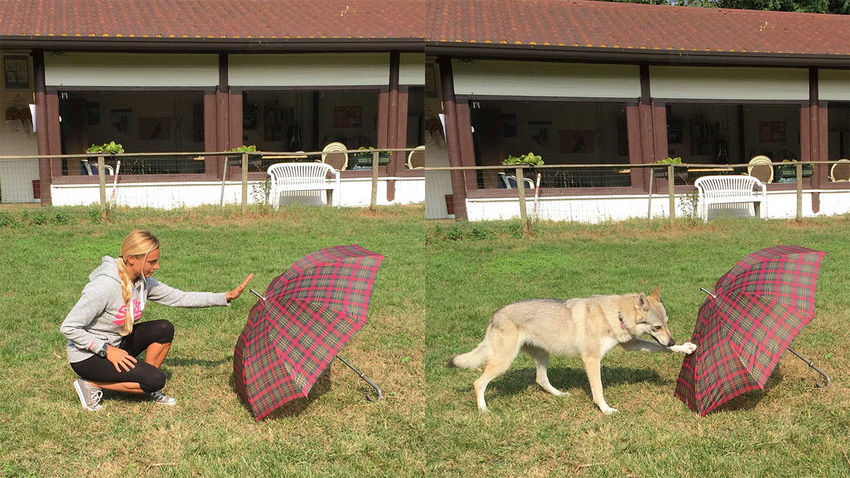Your dog remembers more than you think!
Posted in: Brain & Behavior Plants & Animals doi:10.1126/science.aal0424
At last, scientists may have an answer to a question every dog owner asks: Does your pet remember the things you do together? For people, at least, the ability to consciously recall personal experiences and events is thought to be linked to self-awareness. It shapes how we think about the past—and how we predict the future. Now, a new study suggests that dogs also have this type of memory, indicating that the talent may be more common in other animals than previously recognized.
The study, “is a creative approach to trying to capture what’s on a dog’s mind,” says Alexandra Horowitz, a dog cognition scientist at Barnard College in New York City who was not involved in the research.
The idea that nonhuman animals can consciously remember things they’ve done or witnessed in the past, called episodic memory, is controversial—largely because it’s thought that these animals aren’t self-aware. But scientists have shown that species like Western scrub jays, hummingbirds, rats, and the great apes—those that have to recall complex sequences of information in order to survive—have “episodiclike” memory. For instance, the jays remember what food they’ve hidden, where they stashed it, when they did so, and who was watching while they did it.
But what about recalling things that aren’t strictly necessary for survival, or someone else’s actions? To find out whether dogs can remember such details, scientists asked 17 owners to teach their pets a trick called “do as I do.” The dogs learned, for instance, that after watching their owner jump in the air, they should do the same when commanded to “do it!”
The study, “is a creative approach to trying to capture what’s on a dog’s mind,” says Alexandra Horowitz, a dog cognition scientist at Barnard College in New York City who was not involved in the research.
The idea that nonhuman animals can consciously remember things they’ve done or witnessed in the past, called episodic memory, is controversial—largely because it’s thought that these animals aren’t self-aware. But scientists have shown that species like Western scrub jays, hummingbirds, rats, and the great apes—those that have to recall complex sequences of information in order to survive—have “episodiclike” memory. For instance, the jays remember what food they’ve hidden, where they stashed it, when they did so, and who was watching while they did it.
But what about recalling things that aren’t strictly necessary for survival, or someone else’s actions? To find out whether dogs can remember such details, scientists asked 17 owners to teach their pets a trick called “do as I do.” The dogs learned, for instance, that after watching their owner jump in the air, they should do the same when commanded to “do it!”
“But that alone doesn’t prove episodiclike memory,” says Claudia Fugazza, an ethologist at Eötvös Loránd University in Budapest, and the study’s lead author. “You have to test them when they don’t expect it.”
So in the next round of training, the owners taught their dogs to lie down after watching them do something like touching an open umbrella or stepping up on a chair. They were no longer required to imitate. “And then we surprised them,” Fugazza says. Again, an owner performed an action, but this time after the dog laid down, the owner ordered, “Do it!” The dog then had to recall what it had seen its owner do, even though it had no expectation that it needed to remember the action. The dogs were tested in this way both 1 minute and 1 hour after watching their owners.
The dogs succeeded in 33 of 35 trials. That suggests that dogs have something similar to episodic memory, Fugazza and her team report today in Current Biology. But the longer the canines wait, the more trouble they have recalling the action. That’s similar to human episodic memory, which decays at a faster rate when an event isn’t intentionally recorded, the researchers say. For instance, you’re more likely to remember your first kiss than a hug last week from your spouse.
"It shows that our dogs remember events much like we do, and [it] blows out of the water the old way that most scientists would characterize animal memory,” says Brian Hare, a dog cognition expert at Duke University in Durham, North Carolina, who was not involved in the study. “Our dogs’ memories aren’t based simply on repetition and reward.”
Discovering that this type of memory is not unique to humans means it “did not evolve only in primates, but is a more widespread skill in the animal kingdom,” Fugazza says. Indeed, parrots, dolphins, and killer whales could be the next ones to be tested, because other researchers have already taught these species to “do as I do.” Most likely, they remember more than we think.
So in the next round of training, the owners taught their dogs to lie down after watching them do something like touching an open umbrella or stepping up on a chair. They were no longer required to imitate. “And then we surprised them,” Fugazza says. Again, an owner performed an action, but this time after the dog laid down, the owner ordered, “Do it!” The dog then had to recall what it had seen its owner do, even though it had no expectation that it needed to remember the action. The dogs were tested in this way both 1 minute and 1 hour after watching their owners.
The dogs succeeded in 33 of 35 trials. That suggests that dogs have something similar to episodic memory, Fugazza and her team report today in Current Biology. But the longer the canines wait, the more trouble they have recalling the action. That’s similar to human episodic memory, which decays at a faster rate when an event isn’t intentionally recorded, the researchers say. For instance, you’re more likely to remember your first kiss than a hug last week from your spouse.
"It shows that our dogs remember events much like we do, and [it] blows out of the water the old way that most scientists would characterize animal memory,” says Brian Hare, a dog cognition expert at Duke University in Durham, North Carolina, who was not involved in the study. “Our dogs’ memories aren’t based simply on repetition and reward.”
Discovering that this type of memory is not unique to humans means it “did not evolve only in primates, but is a more widespread skill in the animal kingdom,” Fugazza says. Indeed, parrots, dolphins, and killer whales could be the next ones to be tested, because other researchers have already taught these species to “do as I do.” Most likely, they remember more than we think.
|
There are tons of misguided dog owners out there hearing a lot of misconceptions and advice that (probably) came from their friend’s mother’s cousin.
|
It’s been a few years since the first melamine-related pet food recall, and during that time, more dog lovers than ever have decided to turn to homemade diets—cooked or raw—as insurance against potential problems with commercial products.
|
You can never think too far ahead when it comes to fitting the baby in with your fluffy “kids”. Animal behavioural consultant Carole O’ Leary believes that you should start this process when pregnant instead of waiting for the baby to be brought home. Here are a few of her tips:
|






